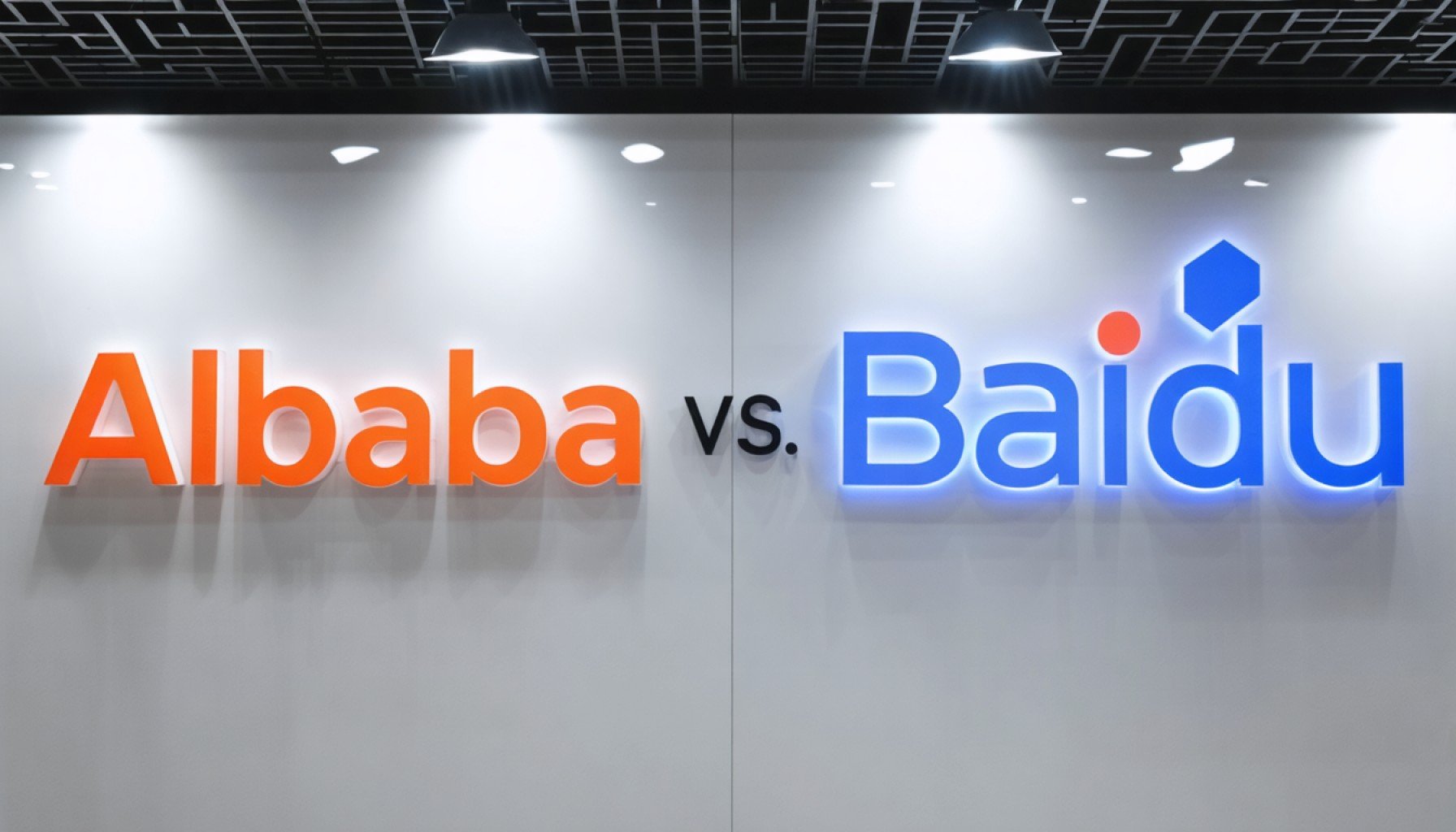- Alibaba and Baidu are competing for leadership in the rapidly evolving field of artificial intelligence in China.
- Alibaba integrates AI into its vast ecosystem, enhancing e-commerce and cloud services, and developing AI products like the Qwen language model.
- Baidu has transformed itself into an AI leader, with innovations like Apollo Go, its autonomous ride-hailing service, having completed over eight million rides.
- While Alibaba pursues international diversification, Baidu remains focused on the domestic market, adapting to China’s regulatory and political environment.
- Both companies offer investors distinct opportunities: Alibaba with its diverse portfolio and Baidu with its focused AI innovation.
- The competitive landscape represents a pivotal moment in the AI renaissance, with no clear winner, but substantial potential for growth.
A digital showdown unfolds in China as Alibaba and Baidu, two titans of the tech world, vie for dominance in the rapidly evolving realm of artificial intelligence. These giants, deeply entrenched in the fabric of China’s tech ecosystem, are not just reshaping their destinies but also charting the future of AI.
Picture Alibaba, an e-commerce behemoth that stretches across cloud computing, logistics, and fintech. Its landscape teems with opportunity, where AI technologies blend seamlessly with apps on Taobao and Tmall, enhancing customer journeys with personalized recommendations and efficient logistics. Alibaba’s forte lies in leveraging AI to boost existing services, all while using its cloud infrastructure to roll out cutting-edge AI products, including Qwen, a large language model.
Now meet Baidu, a visionary that has embraced AI at its core, transforming itself beyond a search engine into an AI powerhouse. This transformation comes alive with Apollo Go, its autonomous ride-hailing marvel, which zips through urban streets, having completed over eight million rides. Baidu’s stronghold in search advertising and cloud computing enriches its strategic focus on AI, crafting a narrative of innovation and autonomy.
Yet, while Alibaba extends its reach beyond China’s borders, diversifying risks across global markets, Baidu remains firmly rooted in China, where regulatory tides and political shifts shape its path. Both companies, resilient and cash-rich, stand at a crossroads, offering investors a compelling choice between a broad, multifaceted approach and a focused AI-centric ambition.
In this technological tug-of-war, there is no definitive victor. It’s a choice between Alibaba’s sprawling empire and Baidu’s razor-sharp focus on AI. Whichever path investors tread, both champions are poised to lead the AI renaissance.
The AI Battle in China: Alibaba vs. Baidu – What You Need to Know
How-To Steps & Life Hacks
1. Investing in AI Companies:
– Research: Dive deep into financial reports and industry analyses about Alibaba and Baidu.
– Portfolio Diversification: Consider the strengths of each company. Alibaba is ideal for those interested in e-commerce and international expansion, while Baidu suits those focused on AI and automation technologies.
– Monitor Regulatory Changes: Stay updated on China’s tech regulations, which greatly impact tech investments.
2. Utilizing AI Platforms:
– Alibaba’s Taobao and Tmall: Optimize shopping experience by personalizing product recommendations through AI-driven insights.
– Baidu’s Apollo Go: Experience autonomous driving technology, possibly integrating it into existing transportation or logistics services.
Real-World Use Cases
– Alibaba: AI-enhanced supply chain management reduces delivery times and improves customer satisfaction in e-commerce.
– Baidu: Apollo Go is transforming urban mobility, highlighting advances in safety and efficiency in ride-hailing services.
Market Forecasts & Industry Trends
– According to Gartner, the global AI market is expected to grow significantly, reaching $500 billion by 2024. This expansion bodes well for Alibaba’s and Baidu’s AI initiatives.
– AI adoption in autonomous vehicles is expected to surge, benefitting Baidu’s Apollo Go program.
Reviews & Comparisons
– Alibaba: Offers a diverse array of services with AI enhancing every component from logistics to customer service.
– Baidu: Has garnered positive press for its focused approach in AI, specifically autonomous driving, which is praised for its innovation and safety record.
Controversies & Limitations
– Alibaba: Faces challenges with international expansion, including regulatory barriers in new markets.
– Baidu: While its domestic focus is a strength, it limits growth potential compared to more internationally diverse tech firms.
Features, Specs & Pricing
– Alibaba Qwen: Large Language Model with capabilities akin to Western counterparts like OpenAI’s GPT. Integrated within Alibaba’s ecosystem to enhance cloud and retail services.
– Baidu Apollo Go: Features autonomous driving technology, supported by over eight million safe, completed rides, testing the limits of current AI driving technology.
Security & Sustainability
– Data Security: Both giants invest heavily in cybersecurity to protect user data amidst increasing concerns over data privacy.
– Sustainability Initiatives: Both companies are working towards greener AI solutions, with Alibaba’s cloud computing focusing on energy efficiency and Baidu’s autonomous vehicles reducing emissions.
Insights & Predictions
– Both companies will likely continue investing heavily in AI, given the sector’s promising growth prospects.
– Baidu may seek to expand its reach internationally, challenging Alibaba on new fronts.
– Alibaba is expected to enhance its cloud AI products further, strengthening its foothold globally.
Tutorials & Compatibility
– Users can access tutorials on deploying Alibaba’s AI tools within cloud platforms or integrating Baidu’s AI in mobile and automotive applications through their respective developer sites.
Pros & Cons Overview
– Alibaba Pros: Diverse portfolio, strong international presence, robust e-commerce infrastructure.
– Cons: Regulatory challenges abroad, intense competition in the cloud space.
– Baidu Pros: Strong focus on AI, trailblazing autonomous driving, solid advertising revenue.
– Cons: Limited international market reach, dependency on Chinese market dynamics.
Actionable Recommendations
– For Investors: Consider balance and risk tolerance when choosing between Alibaba and Baidu. Diversify by investing in both to leverage their unique strengths.
– For Tech Enthusiasts: Embrace AI technologies through platforms provided by Alibaba and Baidu for enhanced user experience and business optimization.
For more insights, visit the official sites of Alibaba and Baidu for the latest updates.



















